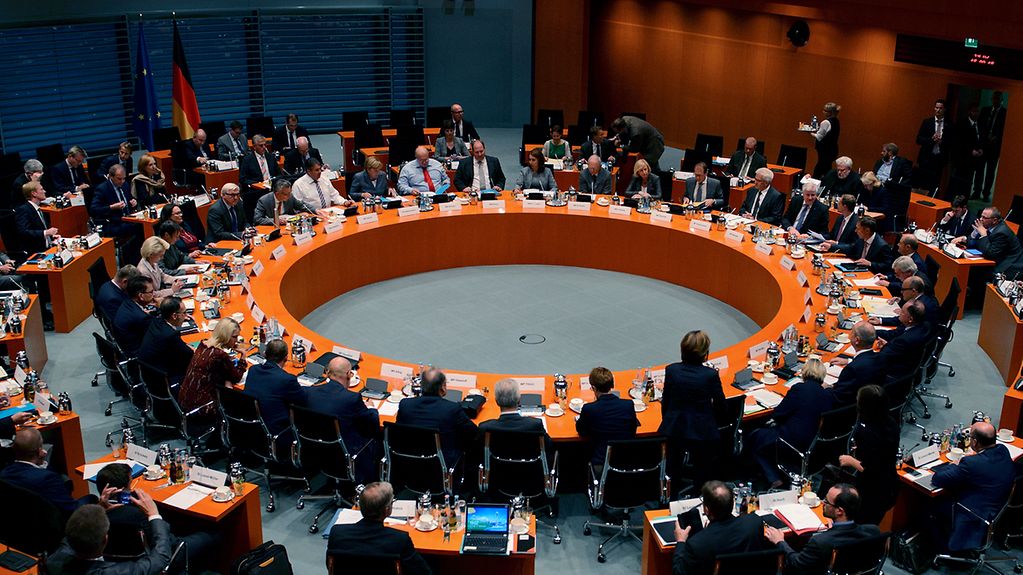Federal government and states meet on refugees
After the meeting between the federal government and the German states, Federal Chancellor Merkel emphasised: “the state as a whole must now make a massive effort” to overcome the challenge. She was pleased with how much the Minister-Presidents are supporting the federal government.
3 min reading time

The federal government and the Minister-Presidents meet at the Federal Chancellery to discuss asylum and refugee policies.
Photo: Bundesregierung/Güngör
On a national level, the federal government will relieve the burden on the states by assisting with the logistics of providing accommodation.
After meeting with the Minister-Presidents, Federal Chancellor Angela Merkel emphasised that the goal of these discussions was not to resolve legislative and financial issues. This will take place at the meeting next week, on 24 September. The details of the measures discussed today will also be finalised then.
Improve initial reception
The federal government wants to assist the states with the “logistics of providing accommodation”, and provide support with the initial reception of refugees. It has offered to create up to 40,000 places in initial reception centres.
“In future, the federal government and the states will together also manage the redistribution of the refugees to the individual states, based on the Königstein formula,” said Merkel. “This requires that all the states agree to use the Königstein formula – which is what happened today.”
The Federal Chancellor emphasised the importance of distribution centres: “Such hubs are necessary.” Four centres for processing applications for asylum will start operating on 1 October. The technical infrastructure for mobile teams has also been put in place.
“The German armed forces have once again clarified that they are ready to provide more personnel to deal with the issue of how we can also overcome all the logistical challenges, for example in the distribution centres to be established.”
Financial support from the federal government
In 2015, the federal government will provide one billion Euros to the states and municipalities, for reception, accommodation and healthcare for asylum seekers. In 2016, the federal government will spend an additional six billion Euros. It will increase its own expenditure by three billion Euros, and also provide a further three billion Euros to the states and municipalities.
Provide protection
“All in all, there was great unity that we want to provide protection for those who need it, and to do everything humanly possible to achieve this,” emphasised the Federal Chancellor. “On the other hand, however, it was also clear that those who have no perspective of staying cannot remain in our country – and this is the shared wish of the states and federal government.” To ensure this, personnel from the German armed forces and customs will be deployed to assist the Federal Office for Migration and Refugees (BAMF).
“Now it's about once again achieving an orderly and traceable process for dealing with the large number of refugees,” said Merkel. “We have spoken about accelerating the process. The federal government will also provide more details about this in the coming weeks. The federal states are also making significant efforts in this regard, for example to speed up the processing of cases at the administrative courts.”
Employees at the Federal Office for Migration and Refugees
The Federal Office for Migration and Refugees currently has around 3,000 employees at its headquarters in Nuremberg and the 31 branch offices nationwide. In the 2014 federal budget, the Federal Office gained 300 new jobs, and in the 2015 budget a further 350 new jobs for dealing with asylum seekers. These positions have all been filled already. With the 2015 supplementary budget, the Federal Office was allocated another 750 new jobs, plus funding for an additional 250 employees.
The Federal Office is working hard to fill these new positions, the jobs are already being advertised. The goal is to have recruited the 1,000 new employees by the end of November. In the 2016 budget, the Federal Office will be allocated up to 1,000 new jobs. Support for the Federal Office from present and former employees of other authorities on a federal and state level is currently being prepared.
EU distribution of refugees
The federal government and the Minsiter-Presidents agreed that they expect clear signals from the EU that the humanitarian situation in refugee camps, for example in Jordan, Iraq and Lebanon, will be improved. There are serious funding shortages, for example at the World Food Programme.
The Federal Chancellor repeated that she expects the burden to be shared fairly across the EU. It is therefore “good news” that the EU interior and justice ministers will be meeting again next Tuesday.